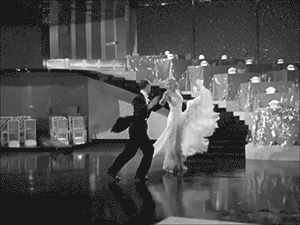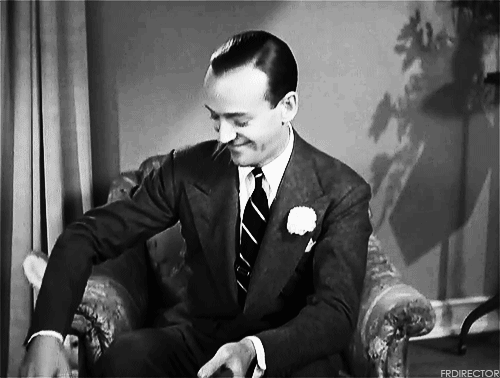The several minutes of forced laughter isn’t the only thing cringey about this film
Y’know, my friend has something called the Thumper Rule: If you can’t say something nice, don’t say nothing at all. And I try to abide by it, but most of the time I’m like Olympia Dukakis in Steel Magnolias.
I tried, I tried really hard to understand why Swing Time is so high on the list. If we’re only considering the Fred and Ginger dance numbers, sure, you could make a case, because they’re amazing and at the top of their game. The choreography in this movie is fire, and the repeating motif of them walking side by side together picks up emotional weight as the story progresses. But literally everything else about this movie is annoying to me. The “Fred and Ginger Formula” is now starting to lose its luster.
Fred Astaire’s character, Lucky, is a gambler/dancer, and he’s supposed to be getting married to an affluent women named Margaret immediately after he tap dances off the stage. His friends, who for sure have grandkids who think that Saturdays Are For The Boys, have decided to sabotage this endeavor by telling Lucky his pants are so last season. Lucky kills time waiting on them to be tailored by rolling some dice, and several hours later, when he figures out he’s been tricked, he shows up to his own wedding several hours late after all the guests have left. While his fiancé and her father are initially furious with Lucky, he tells them he was out earning a dumb amount of money, and offers to buy Margaret for $25k. They agree to this arrangement because they are terrible people.
Lucky flees to New York with his unscrupulous friend Pop to gamble his way into a wife. He encounters Penny at the cigarette machine when he trades her his lucky quarter for a few dimes and a nickel. Thirty seconds later, when he gets the money to trade it back, she refuses because she thinks he’s attempting to pick her up. While she’s trying to rebuff Lucky’s advances, Pop steals the quarter from her purse, and she alerts a policeman because she thinks Lucky took it. The policeman, being super on-brand, calls her a crazy broad and threatens to arrest her for disturbing the peace because Lucky is wearing a nice suit. She leaves, Pop reveals to Lucky he actually did steal the quarter from Penny, and Lucky follows her into her place to business to return the money… again.
If this sounds super convoluted, it is. This is, by far, the dumbest meet-cute I’ve ever encountered, and I’ve lived through and been forced to watch nearly all the terrible early 2000s romantic comedies.
To Lucky’s absolute luck, Penny works at a dance studio, so Lucky pulls a Cady Heron and pretends he doesn’t know how to dance in order procure some lessons. Penny is pleased as punch to see him, and doesn’t slug him on site because she wants to keep her job. Once Lucky finally admits that he’s a premium dancer, Penny’s boss books the two of them a gig at the Silver Sandal, as long as Lucky can show up in a tuxedo.
Lucky, of course, only has a stolen quarter to his name, so Pop runs out to try and scam a drunk guy into betting his dapper clothes. Penny walks in on her new friends playing strip poker with a guy 3 sheets to the wind and storms off, furious she’s going to miss her new gig because the guy who accosted her in the street turned out to not be on the up and up.
A week later is enough time for Lucky to bankroll a new wardrobe, a room at the inn, and a new audition at the Silver Sandal. Penny’s refusal to forgive Lucky for blowing their first chance at stardom results in Lucky picketing outside her door.
When that doesn’t work to turn her favor, he decides to serenade her with the most famous song of this movie, “The Way You Look Tonight”. I have heard Frank’s showy, bouncy version of this song about a million times, but I do enjoy Fred’s version as it sounds more tender and sincere.
This is enough to make Penny swoon, and they head to The Silver Sandal together. Lucky discovers that the band leader, Ricky, is not only handsome, but has proposed to Penny several times. Lucky has the nerve to act jealous even though, if you remember, he’s already engaged to Margaret back home. Ricardo also views Lucky as a threat and refuses to play a song for Penny and Lucky’s audition so they cannot dance together. Lucky decides to use his gambling super powers to win the band’s contract from a club owner and force Ricky’s orchestra to play. Penny is somehow charmed by this because his gambling addiction has now directly benefitted her.
They ace the audition and Penny and Lucky book the gig. Lucky negotiates down the terms of his payment so he doesn’t make over $25k and have to return to his hometown to purchase/marry his fiancé. Conversely, he is trying his best not to be left alone with Penny as he’s now fallen in love with her. Penny, unfortunately, feels the same way about him, and decides to make a bunch of unreciprocated moves that just give her blue balls. When Lucky finally decides that cheating on his fiancé sounds like a good idea, Pop intervenes and tells Penny that Lucky’s engaged and she rightfully turns cold toward him. This only lasts about 3 minutes, and soon she’s making awkward advances before making out with him in their dressing room.
Right as my exasperation in this back and forth romance hit its peak, Fred distracted me by walking over to his dressing table and smearing black paint on his face. Oh. Oh no.
Oh nooooooooooo. I thought after The Jazz Singer I was in the clear for shit like this on the list, but nope, turns out one of the most famous dancers in the world decided that blackface was a great idea.
This is um… This is straight up offensive. No amount of shuffling around is going to make me defend a number that starts with comparing the skin color of black people to the bottom of shoes. I found a great article by Katrina Richardson that elaborates why this number, even in 1936, was in very, very poor taste.
Bill “Bojangles” Robinson is the man Fred is “paying tribute to” in this number. My grandmother loved Shirley Temple and bought me The Little Colonel when I was a kid, which I watched once and unceremoniously stored in our VHS cabinet because I had no interest in a precocious seven-year-old that pretends not to know how to read, or a movie about The South™. But I remember this scene because I was simultaneously fascinated by his dancing and afraid he was going to fall down the stairs. Honestly, spending several hours on youtube watching Mr. Robinson dance was the only redeeming part of being forced to watch Swing Time.
Anyway… Directly after the number, Lucky gambles away the orchestra because Pop revealed that Lucky cheated it off of the club owner the first time. Immediately after that, Margret and Penny finally meet each other, and Penny is so devastated that Lucky is still going to marry her that she runs off and accepts Ricky’s latest proposal. Lucky is similarly disappointed they’re heading in different directions and tells Penny that he’s going to punish himself for marrying someone he doesn’t love by never dancing again.
Fred and Ginger’s dance numbers always tell a story, and this movie features several perfect examples of how their movements illustrate their current feelings toward each other. In the beginning, they start their journey by taking a few steps together, and we similarly revel in the joy on Penny’s face realizing Lucky can meet her move for move. When they are auditioning for the club, they come out confident and fierce, knocking everyone’s socks off because they realize how special their relationship is and want to flaunt it in front of everyone (especially Ricky). In “Never Gonna Dance”, their steps are nostalgic, echoing the previous numbers before, and eventually send them in two separate directions and up two separate staircases. They’re reunited quickly and furiously at the top, giving into their passion for one another. But by the end of this number, Penny is sprinting away from Lucky, as its the only way they can part. It’s so beautiful it makes me forgive the plot I had to trudge through to get here. Also, Astaire insisted on over 40 takes of this number and Ginger’s feet were bleeding through her shoes by the end of it, which only highlights Fred’s perfectionism and Ginger’s perseverance.
Alas, Lucky and Penny didn’t need to break up in the first place, because Margret has decided to break off their engagement because she wants to marry someone else. Lucky then decides to tell Margret that he’s in love with Penny, and she starts laughing because it’s all very funny and conveniently timed. Lucky rushes over to break up Penny and Ricky’s wedding and Lucky and Penny live happily ever after even though she doesn’t like that he gambles and he seems incapable of not doing so. The end.
Swing Time is a whole lot of fluff and no substance, which is completely fine, it just annoys me when the plot hinges on a series of secrets or misunderstandings. The director of this movie, George Stevens, had filmed several movies with Fred and Ginger, together and separately, until he enlisted in the US Army during World War II in order to document it. He was present during D-Day, and also filmed the conditions of the concentration camps. The footage he captured was used as evidence during the Nuremberg Trials. Needless to say, this guy saw some shit, and it changed the kind of content he produced afterward.
In the 1970s, he was head of the jury at the Berlin International Film Festival, which issued no awards because the jury eventually resigned. A film about the Incident on Hill 192, o.k., was cut-off mid-screening and removed from the festival because a majority of the jury believed “All film festivals should contribute to better understanding between nations”. Stevens himself called the movie “anti-American”, and was the driving force behind its disqualification. The jury actually had no right to turn the film off, or question its qualification in the first place, which caused several directors of competing films to withdraw their movies from the competition in protest. Many looked upon the film’s exclusion as censorship and called for a dissolution of the entire institution of Berlinale. This didn’t happen – they restructured and have been conducting the event ever since. Although a few years ago they did have to rename one of their awards when it was revealed its namesake Alfred Bauer’s involvement in creating Nazi propaganda “was more significant than had previously been known”… Yikes.
But I found it both curious and unsurprising that Stevens had such a visceral reaction to o.k., as United States patriotism was the key motivating factor during the second world war. The sacrifices made by the soldiers and their families was under the premise it was for The Greater Good. The heroes in the US of A would be getting revenge on those no-good Fascists and Imperialists because here in America, we believe in Freedom™.
Not to suggest the US shouldn’t have been involved in the war, but our own (sometimes racist) propaganda shaped the views of the entire generation. I’m going to go out on a limb and guess that a lot of WW2 veterans struggled with those who protested the war in Vietnam, and had a hard time beings faced with the fact that United States soldiers could become power-hungry monsters that commit atrocious war crimes.
But I majorly digress… Swing Time is, conversely to the previous diatribe, Pre-WW2 glamourous escapism, where the worst a woman could encounter was a philandering gambler who didn’t cuff his pants.










Trackbacks/Pingbacks